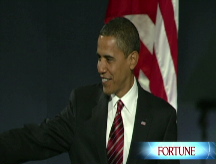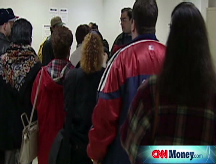A goal we can believe in
As President, Obama should get us focused on one clear economic mission: boosting U.S. exports. A renowned management expert offers his plan to help America compete.
 |
| Maine boat builders like Hodgdon, here fabricating a yacht, have banded together to compete on a global scale. |
NEW YORK (Fortune) -- We are now experiencing a full-blown crisis of confidence in America's economy. It shows up in consumer spending, which fell more than 3% in the third quarter, the sharpest drop since the dark days of 1980. Corporations are cutting their capital investments drastically for 2009. People see unemployment rising and have good reason to think it could happen to them, if it hasn't already. By September, 760,000 jobs had been lost in the U.S. this year, with more mass layoffs announced every day.
As President-elect Obama said in a speech in October, "At this rate, the question isn't just 'Are you better off than you were four years ago?' It's 'Are you better off than you were four weeks ago?'"
The current administration has rushed to put emergency measures in place: stimulus packages, a bailout for the banks, low-interest loans for the auto industry. All that rescue work is necessary to ease the severity of the recession and to reassure people that help is on the way.
The new President, however, must go a lot further than that. He needs to restore faith in America's economic engine. He must show real leadership to do that. But what does that mean in a situation like this? It may seem counterintuitive at the moment, when there are so many short-term dangers, to get Americans focused on the long run. But that's what the new President needs to do. As Obama himself said during the campaign, "It is going to be part of the President's job to deal with more than one thing at once." Confidence depends not only on urgent, short-term patchwork but also on the pursuit of believable and attainable goals. That's what a true leader does: sets a goal that is clear and then inspires people to focus on achieving it. That's how great organizations are run, and that's what this great country desperately needs at this moment. The next President can get us out of this psychological and economic funk by pointing the way ahead, especially with one overarching objective.
Here's what I propose: Set a goal to get our fair share of exports and jobs in the world. That means putting aside our protectionist impulses and rolling up our sleeves to compete with the rest of the globe. Americans can do this: Our productivity is still among the highest in the world. And according to the Bureau of Labor Statistics, business sector productivity in the U.S. increased 19% from 2000 to 2007. The U.S. is the best in the world at nurturing new businesses and technologies, we have the best institutions of higher learning, and even our labor cost is competitive with Europe and Japan. But somehow all that doesn't translate into an ability to capitalize fully on our strengths.
A key barometer for measuring how we stack up competitively is our level of exports. Very simply, it tells us whether our companies are innovative enough and efficient enough to sell things that other countries prefer. In 2007 exports accounted for 12% of our country's GDP. The President should set a national goal of raising that figure by five points. (It's a reasonable place to set the bar: In Germany exports account for more than one-third of GDP.) When we accomplish this, we can revitalize communities by producing more jobs. We will increase our tax base, which will help us meet our growing obligations. We would also wipe away our exploding trade deficit, which threatens our economic future.
One can argue it's never been more necessary for us to produce and invest more. Instead of feeling defensive and mournful about how globalization has changed our economy and taken away jobs, let's respond by competing smarter. Here are specific ways the next President can lead the way.
Rename it the Department of Exports and Imports and make this cabinet post as critical as Treasury or Defense. Appoint a heavyweight who gets things done. Hold the secretary accountable by requiring the department to publish its goals. We should make this whole economic approach part of State Department policy as well, since our diplomats can find out what needs to happen on the ground to get our exports moving.
The U.S. has the best analytic capability in the world. That can give us the facts and insights we need about our trade opportunities and obstacles. The President should launch a competition among the country's top half-dozen consulting firms with a $10 million prize for creating the best plan showing us how to get ahead, region by region and sector by sector. Get them to run analyses on what other areas of the world might be receptive to our products. And have them focus on smaller, midsized companies, which have a lot of room to grow in terms of exporting more.
The next President should call on every governor and mayor in this country to sit down with local businesses, unions, and education leaders to figure out their distinct advantages: What can they do better than not just the town next door but also companies in Ireland and Mexico? Some states and regions are already doing this. The state of Maine is aggressively focused on giving its local boat-building industry the resources to compete worldwide. The state linked boat builders with local economic-development groups and training organizations, including the University of Maine, which offers classes on advanced composites for boat building. Last year a Maine delegation traveled to Shanghai for the China International Boat Show. Without a coordinated effort, that never would have happened.
Discuss priorities for highways, bridges, and airports based on hard facts and analysis. Make them transparent by publishing the results. Let the public see what's needed and allocate the money accordingly. "The infrastructure system is completely broken," says Bruce Katz, vice president of the Metropolitan Policy Program at the Brookings Institution. "It's an unaccountable free-for-all. Earmarks dominate the conversation, as opposed to any sense of a national vision."
Innovation creates jobs. We should increase federal funding for basic research by giving money to the long-delayed America Competes bill, which was signed into law last year by President Bush but has not received any funding yet. Also, corporate tax cuts for R&D need to be made permanent. Just because the economy is slowing doesn't mean that companies should stop looking for the next big idea.
Our level of exports can serve as a scorekeeping device for us all to follow. This group should help keep us up-to-date on where we're improving and where we're vulnerable. In the second presidential debate, in October, one of the best questions of the campaign came from a 78-year-old woman from Chicago named Fiorra. She asked, "As President, what sacrifices will you ask every American to make to help restore the American dream and to get out of the economic morass that we're now in?" The answers from both candidates were underwhelming.
The bottom line is that people are craving leadership. They're awaiting directions. Mr. President, get the spirit of America moving again. All you need to do is set a clear goal, explain why it's important, and then present steps toward achieving it. This time, during this crisis, I have a hunch people will follow.
Management consultant Ram Charan's latest book, Leadership in the Era of Economic Uncertainty, will be published in January by McGraw-Hill. ![]()
-
 The retail giant tops the Fortune 500 for the second year in a row. Who else made the list? More
The retail giant tops the Fortune 500 for the second year in a row. Who else made the list? More -
 This group of companies is all about social networking to connect with their customers. More
This group of companies is all about social networking to connect with their customers. More -
 The fight over the cholesterol medication is keeping a generic version from hitting the market. More
The fight over the cholesterol medication is keeping a generic version from hitting the market. More -
 Bin Laden may be dead, but the terrorist group he led doesn't need his money. More
Bin Laden may be dead, but the terrorist group he led doesn't need his money. More -
 U.S. real estate might be a mess, but in other parts of the world, home prices are jumping. More
U.S. real estate might be a mess, but in other parts of the world, home prices are jumping. More -
 Libya's output is a fraction of global production, but it's crucial to the nation's economy. More
Libya's output is a fraction of global production, but it's crucial to the nation's economy. More -
 Once rates start to rise, things could get ugly fast for our neighbors to the north. More
Once rates start to rise, things could get ugly fast for our neighbors to the north. More









